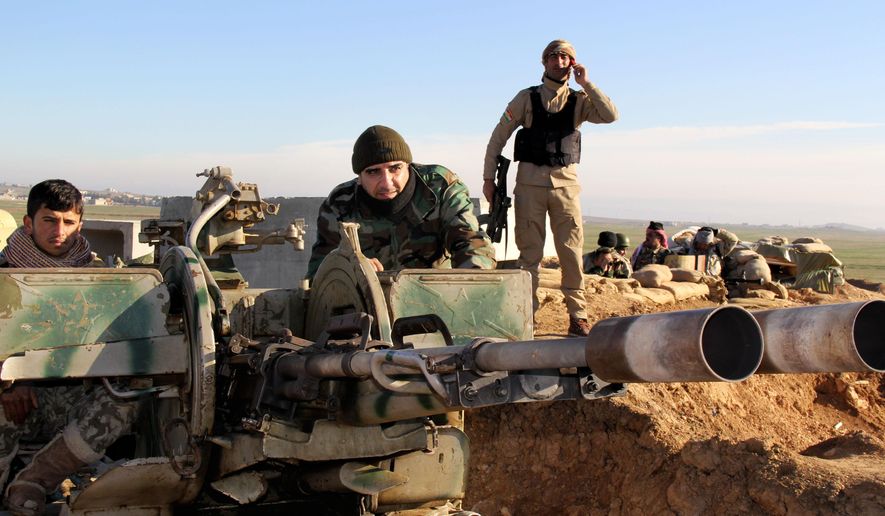Iraqi Kurdish fighters, the first to seriously confront the Islamic State invasion nine months ago, remain woefully short of arms as the central government in Baghdad withholds shipments of front-line American weapons, a top Kurdish official said.
Bayan Sami Rahman, the Kurdistan Regional Government (KRG) representative to the U.S., issued a dire warning this month that the Kurdish peshmerga forces face a violent and better-equipped Islamic State, also known as ISIL and ISIS. The terrorist army captured a full inventory of American weapons when it sent the Iraqi army into quick retreat in mid-2014.
“Kurdistan is in a fight for our own existence,” Ms. Rahman said at the Bipartisan Policy Center. “We also feel we are not getting our fair share.”
The Kurds’ cause has attracted a number of allies on Capitol Hill, including Rep. Duncan Hunter, California Republican.
He sent a letter this week urging President Obama “to consider expediting the delivery of resources directly to the KRG given the immediate threat.”
Ms. Rahman said the Iraqi government has control of American M4 rifles, M3 anti-tank weapons, counter-improvised explosive devices and armored vehicles desperately needed by peshmerga troops.
“The peshmerga … are underequipped,” she said. “Some of our weapons date back to the Second World War.”
She said Mr. Obama’s train-and-equip fund of $1.6 billion “gave us great hope that American weapons would be delivered in early 2015,” but “the vast majority of those weapons have not been delivered.”
“The lion’s share of the fight against ISIS is being carried out by peshmerga,” she said, but of 250 mine-resistance vehicles shipped to Iraq, only 25 have been sent to Kurdish-controlled areas of Iraq.
“We want U.S.-origin weapons and equipment, and we believe it should be delivered direct to Irbil,” she said of the city where the U.S. has set up a joint command. “There is no need for it to go to Baghdad.”
The Obama administration says federal law requires that weapons be shipped to the sovereign nation, in this case the Shiite-dominated government in Baghdad. It is then up to the administration of Prime Minister Haider al-Abadi, who is in Washington this week, to distribute the equipment to its army, Shiite militiamen fighting with Iran’s assistance and the Kurds in northern Iraq.
Kurdish-Baghdad relations have been strained. The government has been reluctant to arm Kurdish troops, some of whom talk of resuming their historic push for an independent state from Baghdad once the Islamic State group is evicted.
The irony is, the force that was the most effective against the Islamic State, retaking large sections of territory with the help of U.S. airstrikes, is the one most starved for arms.
“The fact that resources are not reaching the KRG should cause significant concern,” wrote Mr. Hunter, a former Marine officer. “With the support of coalition efforts, Kurdish forces have achieved measurable success against IS and, as a coalition leader, it is imperative that we ensure security resources are being delivered without delay.”
• Rowan Scarborough can be reached at rscarborough@washingtontimes.com.




Please read our comment policy before commenting.